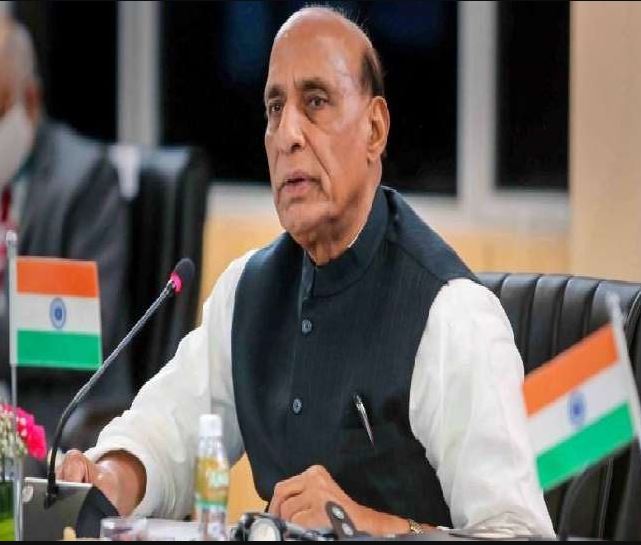


Defence Minister Rajnath Singh addressed the country's top military leaders at a conference in Lucknow, stressing the importance of being prepared for future wars. He urged them to have a mix of traditional and modern warfare equipment while also developing capabilities in space and electronic warfare. Singh also called for a deeper analysis of conflicts happening in the region and the use of the latest technological advancements in data and artificial intelligence in military operations.
Rajnath Singh Calls for India's Military to Prepare for Future Wars
During a recent conference in Lucknow, India's Defence Minister Rajnath Singh emphasized the urgent need for the nation's military to gear up for potential future conflicts. He urged the country's top military leaders to maintain a balanced arsenal of classic and advanced warfare equipment while simultaneously enhancing capabilities in emerging domains such as space and electronic warfare.
Singh's address highlighted the critical importance of keeping abreast of regional conflicts and harnessing the latest technologies, including artificial intelligence and data analytics, in military operations. He stressed the significance of in-depth conflict analysis, particularly in the Indo-Pacific region, and the need for India to remain fully prepared for any eventuality.
Background
India has had a long and distinguished military history, tracing its roots back to the Mauryan Empire. In modern times, the Indian Armed Forces have played a pivotal role in safeguarding the nation's borders, participating in numerous wars and peacekeeping operations.
However, in recent years, India has faced emerging threats, including terrorism, cyber attacks, and geopolitical tensions with neighboring countries. This has prompted the government to prioritize military modernization and enhance its preparedness for future conflicts.
Rajnath Singh's Vision
Defence Minister Rajnath Singh has been a staunch advocate for modernizing India's military. He envisions a force that is equipped with cutting-edge technology, capable of deterring and responding to any potential threats.
Singh's focus on space and electronic warfare capabilities reflects the growing importance of these domains in modern warfare. Space assets provide essential intelligence, surveillance, and communication services, while electronic warfare can disrupt or disable enemy systems.
Top 5 FAQs
1. What are the specific threats that India faces?
India faces various threats, including terrorism, cyber attacks, border disputes with neighboring countries, and geopolitical tensions in the Indo-Pacific region.
2. How is India preparing for future wars?
India is modernizing its military, acquiring advanced equipment, enhancing training, and developing capabilities in emerging domains such as space and electronic warfare.
3. What is the role of the Defence Minister?
The Defence Minister is responsible for overseeing India's military and ensuring the nation's defence preparedness.
4. What is the history of the Indian Armed Forces?
The Indian Armed Forces have a long and distinguished history, dating back to the Mauryan Empire. They have played a crucial role in safeguarding the nation's borders and participating in numerous wars and peacekeeping operations.
5. What are the key takeaways from Rajnath Singh's recent address?
Rajnath Singh's address emphasized the importance of military preparedness, a balanced arsenal of traditional and modern equipment, enhanced capabilities in space and electronic warfare, and in-depth conflict analysis.

The Metro Railway Kolkata has announced a major schedule expansion for its Yellow Line, which runs between Noapara and Jai Hind Bimanbandar (Airport) in Kolkata. Starting from 3 November, weekday operations will increase to 120 services with extended operating hours, providing greater convenience and accessibility to commuters. Weekend travellers will also see a significant frequency upgrade, making travel on Saturdays and Sundays hassle-free. This move is expected to improve the overall public transportation system in the city and benefit the commuters.

Despite some reassurances that online verticals focused on diversity will continue, NBC News has announced a round of layoffs that will impact about 150 employees, or 2% of their workforce. The cuts are said to be a result of cost-cutting measures in preparation for the split of Comcast's cable networks into Versant. This move signifies a shift in priorities for NBC management, prioritizing corporate profits over hard-working members, according to Susan DeCarava, president of The NewsGuild of New York. This change also means that MSNBC will no longer lean on NBC News for newsgathering, with those ties expected to be severed next week.

The Kasibugga Venkateswara Temple in Srikakulam district was the site of a heart-wrenching stampede, causing multiple fatalities and affecting the community deeply. Chief Minister N. Chandrababu Naidu has expressed his sorrow over the unfortunate incident, as well as directing officials to ensure that those injured receive the best medical treatment possible. As local officials and public representatives are called to oversee relief operations, swift action is required to aid those affected and manage the situation effectively.

Indian Prime Minister Narendra Modi inaugurated the Shanti Shikhar Academy for Peaceful World in Raipur, praising the Brahma Kumaris organization for bridging India's ancient wisdom with the world's search for harmony. He credited the group's selfless service and spiritual discipline for their efforts towards universal peace. He positioned the Brahma Kumaris as protectors of India's soul and highlighted India's proactive role in addressing global crises such as disaster relief and environmental threats.

In an act of solidarity and protest, millions of Muslims in India used their Friday prayers to denounce the recent killings that took place in Pahalgam. The news comes amid growing tensions between the Muslim community and the Indian government. Many are viewing this as a sign of unity and determination from the Muslim population in India.

The state of Karnataka, or Kannada Rajyotsava, marked its 69th anniversary with a grand ceremony organized by the district administration in Mangaluru. District in-charge minister Dinesh Gundu Rao paid tribute to the leaders and writers who fought for a unified Kannada state and presented awards to 80 outstanding individuals and organizations. In his address, the minister highlighted the rich cultural and historical heritage of Karnataka and called for a sense of pride among its citizens.

Telangana's 'Run for Unity' event marked the 150th birth anniversary of Sardar Vallabhbhai Patel, India's first Deputy Prime Minister and architect of national integration. The event, carrying the message of "Ek Bharat - Shreshth Bharat", honored Patel's legacy of unity, sacrifice, and nation-building. Telangana BJP President N Ramachander Rao paid tribute to Patel and highlighted his pivotal role in integrating princely states, including Hyderabad, into the Indian Union. He also commended Prime Minister Narendra Modi and Home Minister Amit Shah for upholding Patel's ideals of national integrity.

The FBI has successfully stopped a potential terrorist attack in Michigan on Halloween weekend, according to FBI Director Kash Patel. Multiple suspects have been arrested after allegedly planning a violent attack that was connected to international terrorism. The suspects, whose ages range from 16 to 20, had engaged in firearms training and mentioned "pumpkin day" as a code for Halloween. White House Senior Director for Counterterrorism Seb Gorka confirmed the thwarted attack and stated that it was intended to occur during a time when children should be enjoying themselves.

Amidst criticism over his comments on his interfaith marriage to his Hindu wife, Usha, US Vice President JD Vance reiterates the importance of mutual respect, trust, and communication in their union. While he hopes she may someday embrace his Christian faith, her decision to maintain her beliefs is respected. Despite their differences, the couple has agreed to raise their children in the Christian faith, with Usha supporting them. At a Turning Point USA event, Vance also reaffirmed the couple's balanced approach towards managing their interfaith household.

Three days after TVK leader Vijay met with the family members of the victims of the Karur tragedy, Central Bureau of Investigation (CBI) team led by Superintendent of Police Praveen Kumar visited the rally site in Velusamypuram where the deadly stampede occurred. The officers conducted inquiries with locals and studied the topography of the area, as well as Vijay's travel route. The transfer of the case to the CBI and the re-registration of the FIR remains a secret and its contents have not been made public yet.